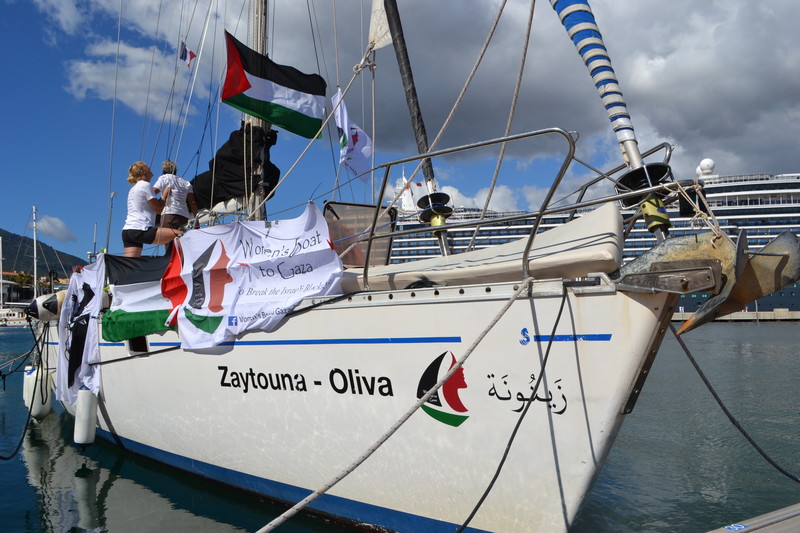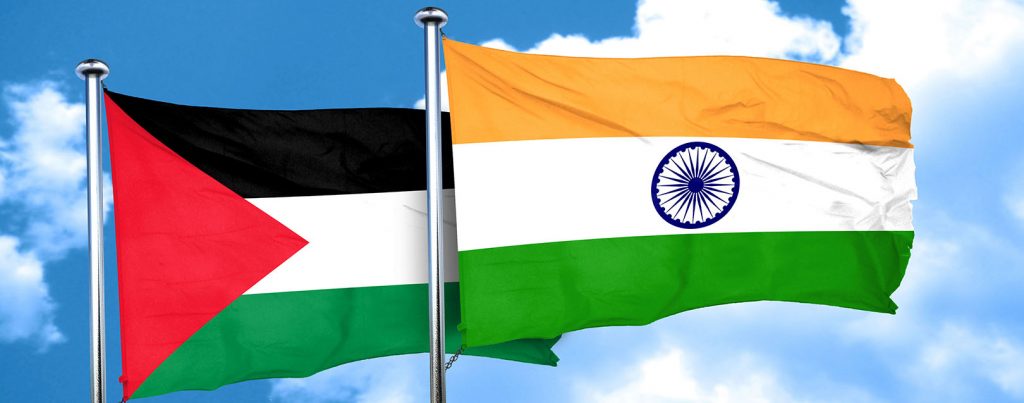
“If somebody falls overboard, all you see is their head. It’s about the size of a coconut.”
With those words, Captain Madeleine Habib ensured the attention of her passengers, all now digesting the image of the vastness of the sea enveloping a human body.
Habib, a Tasmanian-Egyptian and an experienced captain with Greenpeace and Doctors Without Borders, was delivering the safety briefing to the all-women passengers of her boat, the Zaytouna. The three crew and 10 passengers were preparing to leave the port of Ajaccio, the Corsican capital, for Messina, Sicily.
The Zaytouna is part of a now one-vessel Women’s Boat to Gaza flotilla after its sister ship Amal was forced to return to Barcelona because of engine trouble. It was not the only boat in the harbor of Ajaccio, but certainly theZaytouna’s purpose — international solidarity, not leisure — was unique.
The quays here are lined with the yachts of the affluent, from Monaco and the Caribbean, themselves dwarfed by the gargantuan cruise ships which daily arrive and depart, their passengers disembarking to stroll through the narrow streets and palm tree-lined corniches of yet another picturesque Mediterranean town.
The Women’s Boat to Gaza flotilla is the most recent international attempt to break the near decade-long sea, air and land siege of Gaza. There have been other attempts, and some, like the Mavi Marmara in 2010, ended in violence when the Israeli navy stormed aboard. Nine activists were killed on the Mavi Marmara and a 10th died after four years in a coma.
Safety briefing
Though the day was warm and bright, with the early morning sun glistening and glimmering in the harbor of Ajaccio, Habib was clear about the potential dangers at sea should the weather turn.
“On a day like today you can see a coconut for a long way. But nobody falls overboard on a day like today. People fall overboard when it’s rough,” she said. The chances of “rescuing a coconut” in rough seas, especially at night, the captain added, are minimal.
Habib reassured her passengers, several of whom had just joined for the crossing to Messina, that if “you’re careful, if you’re sensible, and if you follow the instructions of the crew, you will not fall overboard.” Then comes the inevitable “however.”
If someone should fall overboard, she told her passengers, they must immediately shout “man overboard, women overboard, I don’t care what you shout, but the person driving the boat needs to know.”
A button, the captain informed her passengers, would then immediately be pressed on the control panel to lock in those precise coordinates, allowing the boat to return and begin a search.
The risk of fire was also discussed, and Habib, a trained firefighter, was relieved to learn there were no smokers on board, though the gas stoves used for communal meals still pose a potential fire hazard.
The final warning was about the need to abandon the boat altogether, the worst-case scenario, and one which Habib insisted is extremely unlikely to happen. She pointed to two small, white boxes attached to the roof of the boat, above the cabins. Slightly bigger than wheel-on suitcases on a flight, these boxes will inflate and can carry eight persons each.
With the safety briefing over, final farewells were said and hugs shared. The boat was unmoored and cast off, overshadowed by the hulking mass of a cruise ship unloading passengers for a day’s sightseeing, largely unaware of what they were witnessing.
Symbolic attempt
The flotilla is, at its core, a symbolic attempt to bring international attention to a blockade that has further impoverished and isolated Gaza, while sending a message of solidarity to Palestinians there.
The all-women boat is also meant to acknowledge the role of Palestinian women in the struggle, as they face the effects of occupation and settler-colonialism in specifically gendered ways. Women also carry the bulk of responsibility for the care of traumatized children. According to the United Nations, more than 160,000 children in Gaza are in need of continuous psychological support.
The all-women flotilla also has very practical reasons. It encourages the participation of women who otherwise could feel uncomfortable in a cramped, confined space with men for days at a time.
There is, as well, an element of deterrence. Claude Léostic, the president of the Platform of French NGOs for Palestine, and French spokesperson for the Freedom Flotilla Coalition, referred to the violence inflicted on previous flotillas, which are foremost in the minds of the Zaytouna’s passengers.
“We believe it is very possible that the Israelis will try to attack the boat again, because they did every single time we sent a boat to break the siege. They attacked it. Hijacked it. Stole everything on board. Kidnapped people on board. And behaved just like pirates on the high seas,” Léostic told The Electronic Intifada.
“We hope that with women on board they [the Israeli navy] will be deterred from being so violent,” she added.
“Maybe it’s just wishful thinking, but their image is so important for them. So if they’re seen attacking a women’s boat, ill-treating them, maybe beating them as they did for all the others, their image will be catastrophic. So that could be a deterrent.”
Léostic said there was no evidence of sabotage on the Amal, now back in Barcelona. However, Ann Wright, a veteran of previous flotillas and a boat leader on the Zaytouna, said that threat is being taken seriously.
“We’ve had guards on the boats all the time, since … Barcelona. There’s been someone on the boats 24 hours a day.”
Vigilance ahead of final leg
Wright, a former US Army colonel and US State Department official who resigned in protest to the invasion of Iraq in 2003, recounted suspicions of sabotage of previous flotillas.
“One happened in the shipyards in Athens. And we had a rag in ours [a rag in an engine causes engine failure].”
“In 2015,” Wright added, “we had one [boat] that was coming from Corfu [Greece], and it barely got off the docks before it started sinking.”
Wright, who was also in the 2010 flotilla that included the Mavi Marmara, warned, “So the history is that on each one of these flotillas, there’s sabotage.”
Those on board are all too aware that recent attempts at breaking the siege on Gaza have all failed. The 2010 Israeli raid of the Mavi Marmara had the most violent end; a series of other attempts ended with sabotage, or the Israeli navy ramming, hijacking and commandeering boats within international waters.
The likelihood of the Zaytouna making it to port in Gaza is minimal. Given what happened to previous flotillas, it is likely to be intercepted by heavily armed Israeli navy commandos, almost certainly deep inside the theoretical safety of international waters.
If the Zaytouna is physically commandeered by Israeli commandos, or Habib is forced to comply, the boat will probably be taken to the port of Ashdod, where the women will be processed and eventually deported.
So far, though, so good. After three days of sailing, under the combined power of motor and sails, the Zaytounaarrived in Messina on the morning of 23 September. Activities and meetings were organized in the Sicilian port, before the Women’s Boat to Gaza left Sicily on 27 September for the dangerous final leg of the voyage to Gaza.
“These women know that they may be in danger at some point,” Léostic said. “But their sense of justice and their consciences as human beings are such that they cannot risk doing nothing.”
Eoin Wilson is a freelance journalist focusing on Palestine, international solidarity, protest and social movements. Twitter: @eoin_wilson
First published in Electronic Intifada













































